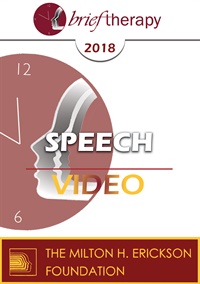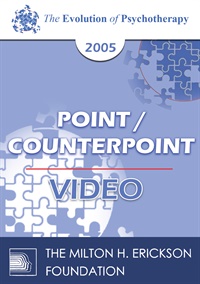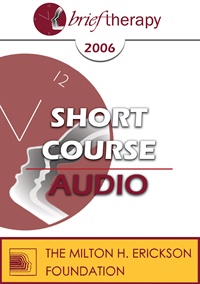
- Average Rating:
- Not yet rated
- Topic Areas:
- Short Courses | Borderline | Brief Therapy | Mind-Body | Neuroscience | Couples Therapy | Narcissism
- Categories:
- Brief Therapy Conference | Brief Therapy Conference 2006
- Faculty:
- Bruce Gregory, PhD
- Duration:
- 1:19:30
- Format:
- Audio Only
- Original Program Date:
- Dec 07, 2006
- Short Description:
- Dealing with narcissistic and borderline defenses that block healthy relating can be quite challenging when dealing with couples. This short course will address ways to creatively apply core aspects of Rossi's mind-body approach to develop treatment plans and interventions that can facilitate the containment of these defenses and help reorganize the dynamics of the couple system. The integration of the psychodynamic system and cognitive behavioral perspectives will be addresses throughout the course.
- Price:
- $15.00 - Base Price
Credit available - Click Here for more information
- Average Rating:
- Not yet rated
- Topic Areas:
- Speeches | Mindfulness | Narcissism | Brief Therapy | Self-Esteem
- Categories:
- Brief Therapy Conference | Brief Therapy Conference 2018 | Online Continuing Education
- Faculty:
- Ronald Siegel, PsyD
- Course Levels:
- Master Degree or Higher in Health-Related Field
- Duration:
- 1:00:31
- Format:
- Audio and Video
- Original Program Date:
- Dec 09, 2018
- Short Description:
- What if our therapeutic goals of improving self-esteem, developing a stable and coherent sense of self, and expressing our authentic feelings all turn out to be misguided? What if they inadvertently feed the cultural enthusiasm for celebrity and success that makes so many of us miserable? This presentation will examine how mindfulness practices can be harnessed in psychotherapy to reexamine our conventional sense of self, leading both us and our clients toward greater well-being, wisdom, and compassion.
- Price:
-
Sale is $29.00
price reduced from Base Price - $59.00
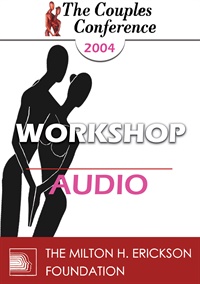
- Average Rating:
- Not yet rated
- Topic Areas:
- Workshops | Narcissism | Differentiation | Relationships
- Categories:
- Couples Conference | Couples Conference 2004 | Pioneers in Couples and Family Therapy
- Faculty:
- Ellyn Bader, PhD
- Duration:
- 1:43:12
- Format:
- Audio Only
- Original Program Date:
- Mar 27, 2004
- Short Description:
- Dive into the complexities of narcissistic relationships through case studies and therapeutic techniques. Learn how to help couples navigate emotional barriers, develop empathy, and build deeper intimacy by understanding the developmental roots of narcissistic behavior and practicing effective differentiation strategies.
- Price:
- $15.00 - Base Price
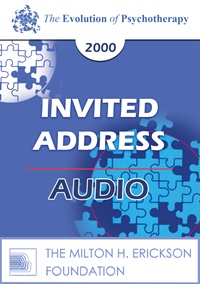
- Average Rating:
- Not yet rated
- Topic Areas:
- Psychotherapy | Invited Addresses | Narcissism | Personality Disorders | Psychoanalysis | Object Relations Theory
- Categories:
- Evolution of Psychotherapy | Evolution of Psychotherapy 2000
- Faculty:
- James F. Masterson, MD | James Hillman, PhD
- Duration:
- 1 Hour 19 Minutes
- Format:
- Audio Only
- Original Program Date:
- May 29, 2000
- Short Description:
- In this paper, Dr. Masterson gives an understanding of the intrapsychic structure of Narcissistic Personality Disorder and how it finds clinical expression through the disorders of the self triad. Clinical cases are presented to illustrate how the therapeutic intervention of mirroring interpretation of narcissistic vulnerability helps the patient to convert transference acting-out to therapeutic alliance and transference, thereby creating the condition for psychoanalytic psychotherapy.
- Price:
- $15.00 - Base Price
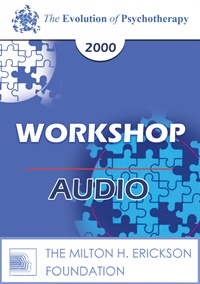
- Average Rating:
- Not yet rated
- Topic Areas:
- Workshops | Narcissism | Personality Disorders | Psychoanalysis | Object Relations Theory | Psychotherapy | Supervision
- Categories:
- Evolution of Psychotherapy | Evolution of Psychotherapy 2000
- Faculty:
- James F. Masterson, MD
- Duration:
- 1 Hour 10 Minutes
- Format:
- Audio Only
- Original Program Date:
- May 25, 2000
- Short Description:
- This workshop comprises three elements: A one-hour videotape demonstrating the use of mirroring interpretation of narcissistic vulnerability to establish a therapeutic alliance, discussion of the tape, and supervision of cases presented by the audience.
- Price:
- $15.00 - Base Price
- Average Rating:
- Not yet rated
- Topic Areas:
- Point/Counterpoint Sessions | Narcissism | Personality Disorders | Psychotherapy
- Categories:
- Evolution of Psychotherapy | Evolution of Psychotherapy 2005
- Faculty:
- Otto Kernberg, MD | James F. Masterson, MD
- Course Levels:
- Master Degree or Higher in Health-Related Field
- Duration:
- 1:18:56
- Format:
- Audio and Video
- Original Program Date:
- Dec 08, 2005
- Short Description:
- Indications and contraindications for supportive and psychodynamic approaches to pathological narcissism will be outlined. Essential techniques of these modalities for narcissistic patients will be described, and alternative approaches examined.
- Price:
-
Sale is $29.00
price reduced from Base Price - $59.00
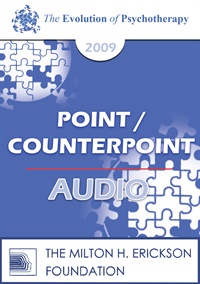
- Average Rating:
- Not yet rated
- Topic Areas:
- Point/Counterpoint Sessions | Narcissism | Personality Disorders | Psychotherapy
- Categories:
- Evolution of Psychotherapy | Evolution of Psychotherapy 2009
- Faculty:
- Otto Kernberg, MD
- Duration:
- 1 Hour 30 Minutes
- Format:
- Audio Only
- Original Program Date:
- Dec 09, 2009
- Short Description:
- Dr. Kernberg will present prognostically unfavorable indications for a psychodynamic psychotherapy of narcissistic patients, and the management of the corresponding difficulties. The description of general characteristics of narcissistic personality disorder, clinical syndromes including the diagnosis, and general principles of psychodynamic therapy for them will compliment this presentation.
- Price:
- $15.00 - Base Price
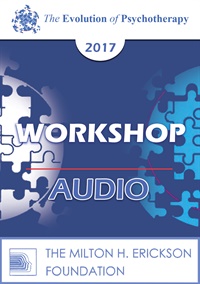
- Average Rating:
- Not yet rated
- Topic Areas:
- Workshops | Psychoanalysis | Personality Disorders | Psychotherapy | Narcissism
- Bundle(s):
- Learning Track - EP17 Psychoanalysis Download
- Categories:
- Evolution of Psychotherapy | Evolution of Psychotherapy 2017 | Evolution of Psychotherapy Psychoanalysis Learning Track
- Faculty:
- Otto Kernberg, MD
- Duration:
- 2:43:55
- Format:
- Audio Only
- Original Program Date:
- Dec 16, 2017
- Short Description:
- This workshop will describe the various clinical syndromes reflecting narcissistic personality disorders, and the corresponding prognostic indicators for psychodynamic psychotherapy. The typical transference developments of these patients will be outlined, and corresponding technical interventions described. The relevance for the love life of these patients will be explored and treatment implications described.
- Price:
- $15.00 - Base Price
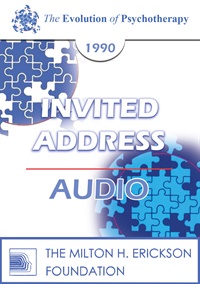
- Average Rating:
- Not yet rated
- Topic Areas:
- Invited Addresses | Borderline | Narcissism | Personality Disorders | Attunement | Therapeutic Relationship | Psychotherapy
- Categories:
- Evolution of Psychotherapy | Evolution of Psychotherapy 1990
- Faculty:
- James F. Masterson, MD | Helen Singer Kaplan, MD, PhD
- Duration:
- 1 Hour 29 Minutes
- Format:
- Audio Only
- Original Program Date:
- Dec 16, 1990
- Short Description:
- The importance of therapeutic alliance is described. Therapeutic alliance, transference, and transference acting-out are defined and distinguished from each other and the therapeutic task of helping the patient to convert transference acting-out to therapeutic alliance and transference is outlined. The differences in the form and content of the intrapsychic structure are described to show why different therapeutic techniques are necessary to establish the therapeutic alliance: Confrontation with the borderline and mirroring interpretation of narcissistic vulnerability with the Narcissistic Personality Disorder. A brief case illustrates each.
- Price:
- $15.00 - Base Price
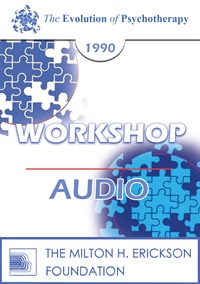
- Average Rating:
- Not yet rated
- Topic Areas:
- Workshops | Narcissism | Personality Disorders | Borderline | Psychotherapy | Supervision
- Categories:
- Evolution of Psychotherapy | Evolution of Psychotherapy 1990
- Faculty:
- James F. Masterson, MD
- Duration:
- 1 Hour 26 Minutes
- Format:
- Audio Only
- Original Program Date:
- Dec 12, 1990
- Short Description:
- This workshop will demonstrate the clinical application of developmental, self and object relations theory to psychotherapy with borderline and narcissistic patients- both shorter and longer term. After brief orienting remarks by Dr. Masterson, the participants will present their clinical material for discussion. This material can vary from single interactions to vignettes to longer presentations. Particular attention will be paid to the role of therapeutic neutrality and countertransference.
- Price:
- $15.00 - Base Price
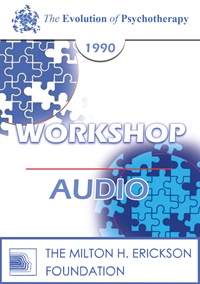
- Average Rating:
- Not yet rated
- Topic Areas:
- Workshops | Borderline | Personality Disorders | Narcissism | Psychotherapy | Supervision
- Categories:
- Evolution of Psychotherapy | Evolution of Psychotherapy 1990
- Faculty:
- James F. Masterson, MD
- Duration:
- 2 Hours 34 Minutes
- Format:
- Audio Only
- Original Program Date:
- Dec 14, 1990
- Short Description:
- This workshop will demonstrate the clinical application of developmental, self, and object relations theory to psychotherapy with borderline and narcissistic patients - both shorter and longer term. After brief orienting remarks by Dr. Masterson, the participants will present their clinical material for discussion. This material can vary from single interactions to vignettes to longer presentations. Particular attention will be paid to the role of therapeutic neutrality and countertransference. This is a repeat offering of Wednesday's workshop.
- Price:
- $15.00 - Base Price
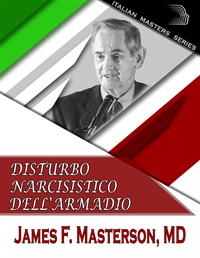
- Average Rating:
- Not yet rated
- Topic Areas:
- Narcissism
- Categories:
- Italian | World Languages
- Faculty:
- James F. Masterson, MD
- Duration:
- 1 Hour 5 Minutes
- Format:
- Audio and Video
- Original Program Date:
- Sep 24, 2019
- Short Description:
- In questa drammatica ricostruzione dei momenti chiave del corso biennale di terapia con David C., un paziente di 31 anni indirizzato dal suo medico, il terapista pionieristico James F. Masterson dimostra - per la prima volta - come diagnosticare e trattare uno dei non ancora classificati nel sistema DSM, questo disturbo, mostra chiaramente Masterson, troppo spesso si presenta come un caso intrattabile di disturbo borderline di personalità.
- Price:
- $59.00 - Base Price


